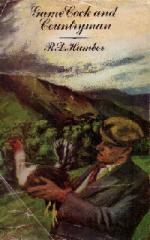

Extract from: Humber
R.D. (1966) Game Cock and Countryman. London: Cassell
The
book begins as follows –
‘When
l was about eight years old my widowed father bought a country house in a
Westmorland village beside the estuary mosses, and within view of the Lakeland
fells if you climbed the prominent hill near by. Called Elm Lawn, it was a long,
low, greystone house; many years ago it had been the vicarage and a turret dome
on the roof, housing a bell, still reminded us that it had once sheltered the
parson.
The
old house lay at the foot of the village of Heversham, named in Domesday, beside
a narrow lane which wandered past our home and served two farms in a winding
descent to the moss plain, where it cut sword-straight alongside the big dyke
and reached the remotest moss farms and one lone cottage smallholding beside the
glistening estuary and the snaking, fell-born river. Here, where the plaint of
the sea-mews and the wail of the curlew merge with the cackle of farmyard
poultry and the lowing of the shorthorns, the eagle wings of the Lakeland fells
can be seen soaring northwards beyond the majestic sweep of Lord's Plain and the
Lyth, enclosed by the limestone headlands of Whitbarrow and Scout Scar.
On
the slopes of the gentle hill known as the Head, rising above Elm Lawn, the
greystone cottages, lowly inn, and several imposing large, pillared country
houses form a horseshoe-shaped hamlet spreading on either side of the noble
parish church of Anglian origin.
A
stony footpath climbs from the large yew and elm shaded churchyard up the hill
to a turnstile in a limestone wall. Immediately beyond the stile a perfectly
formed round grass pit with a raised banking some forty-four feet in diameter
lies beside the haggard ruins of the ancient, round-chimneyed grammar school
founded by Edward Wilson in 1613. This grassy arena was the cock-pit where on
Shrove Tuesdays, prior to 1849 when cockflghting was made illegal, the boys of
the school fought their game cocks after paying a `cock penny' to the
headmaster.
Not
long ago my friend, Tom Willacy, gave me an aged, handwritten record relating to
entrance requirements for Heversham Grammar School. Tom, who is the Sedgwick
village joiner, found the document among old parish records of Sedgwick in a
chest he bought at a local sale. The scribe, using his goose quill pen, had
written-
The
master is appointed by the feoffees and teaches school in the room building by
the Founder.
All
the boys of the Parish as soon as they are able to read with tolerable fluency
are admitted on the foundation and no charge is made except six shillings yearly
for writing and twelve shillings yearly for arithmetic.
A
Gratuity carrying from two shillings to twenty shillings is generally given to
the master on entrance and as a cock penny at Shrovetide.
There
are now in the school about forty boys, sons of parishioners, they are taught
English and the Classics and several boys have gone from hence to the
universities.’
©
Robert D..Humber/Cassell